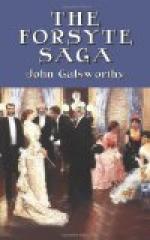Among the older generation it was perhaps known at bottom from what great historical event they derived their crest; and if pressed on the subject, sooner than tell a lie—they did not like telling lies, having an impression that only Frenchmen and Russians told them—they would confess hurriedly that Swithin had got hold of it somehow.
Among the younger generation the matter was wrapped in a discretion proper. They did not want to hurt the feelings of their elders, nor to feel ridiculous themselves; they simply used the crest....
“No,” said Swithin, “he had had an opportunity of seeing for himself, and what he should say was, that there was nothing in her manner to that young Buccaneer or Bosinney or whatever his name was, different from her manner to himself; in fact, he should rather say....” But here the entrance of Frances and Euphemia put an unfortunate stop to the conversation, for this was not a subject which could be discussed before young people.
And though Swithin was somewhat upset at being stopped like this on the point of saying something important, he soon recovered his affability. He was rather fond of Frances—Francie, as she was called in the family. She was so smart, and they told him she made a pretty little pot of pin-money by her songs; he called it very clever of her.
He rather prided himself indeed on a liberal attitude towards women, not seeing any reason why they shouldn’t paint pictures, or write tunes, or books even, for the matter of that, especially if they could turn a useful penny by it; not at all—kept them out of mischief. It was not as if they were men!
‘Little Francie,’ as she was usually called with good-natured contempt, was an important personage, if only as a standing illustration of the attitude of Forsytes towards the Arts. She was not really ‘little,’ but rather tall, with dark hair for a Forsyte, which, together with a grey eye, gave her what was called ‘a Celtic appearance.’ She wrote songs with titles like ‘Breathing Sighs,’ or ‘Kiss me, Mother, ere I die,’ with a refrain like an anthem:
’Kiss me, Mother, ere
I die;
Kiss me-kiss me, Mother,
ah!
Kiss, ah! kiss me e-ere
I—
Kiss me, Mother, ere
I d-d-die!’
She wrote the words to them herself, and other poems. In lighter moments she wrote waltzes, one of which, the ‘Kensington Coil,’ was almost national to Kensington, having a sweet dip in it.
It was very original. Then there were her ‘Songs for Little People,’ at once educational and witty, especially ‘Gran’ma’s Porgie,’ and that ditty, almost prophetically imbued with the coming Imperial spirit, entitled ‘Black Him In His Little Eye.’
Any publisher would take these, and reviews like ‘High Living,’ and the ‘Ladies’ Genteel Guide’ went into raptures over: ’Another of Miss Francie Forsyte’s spirited ditties, sparkling and pathetic. We ourselves were moved to tears and laughter. Miss Forsyte should go far.’




